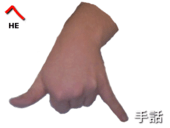He (kana)
へ, in hiragana, or ヘ in katakana, is one of the Japanese kana, which represents one mora. The two ways of writing this mora are almost identical. Each is written in one stroke and represents [he]. The [he] sound is the only sound that is written identically in hiragana and katakana. In the Sakhalin dialect of the Ainu language, ヘ can be written as small ㇸ to represent a final h after an e sound (エㇸ eh).
| Forms | Rōmaji | Hiragana | Katakana | Example words (with kanji) |
|---|---|---|---|---|
| Normal h- (は行 ha-gyō) |
he | へ | ヘ |
|
| hei hee hē |
へい, へぃ へえ, へぇ へー |
ヘイ, ヘィ ヘエ, ヘェ ヘー | ||
| Addition dakuten b- (ば行 ba-gyō) |
be | べ | ベ |
|
| bei bee bē |
べい, べぃ べえ, べぇ べー |
ベイ, ベィ ベエ, ベェ ベー | ||
| Addition handakuten p- (ぱ行 pa-gyō) |
pe | ぺ | ペ |
|
| pei pee pē |
ぺい, ぺぃ ぺえ, ぺぇ ぺー |
ペイ, ペィ ペエ, ペェ ペー |
| he | ||||
|---|---|---|---|---|
| ||||
| transliteration | he | |||
| hiragana origin | 部 | |||
| katakana origin | 部 | |||
| spelling kana | 平和のヘ Heiwa no "he" | |||
| unicode | U+3078, U+30D8 | |||
| braille | ||||
| kana gojūon | ||||||||||||||||||||||||||||||||||||||||||||||||||
|---|---|---|---|---|---|---|---|---|---|---|---|---|---|---|---|---|---|---|---|---|---|---|---|---|---|---|---|---|---|---|---|---|---|---|---|---|---|---|---|---|---|---|---|---|---|---|---|---|---|---|
|
||||||||||||||||||||||||||||||||||||||||||||||||||
Stroke order
 Stroke order in writing へ |
 Stroke order in writing ヘ |

Stroke order in writing へ

Stroke order in writing ヘ
Other communicative representations
| Japanese radiotelephony alphabet | Wabun code |
| 平和のヘ Heiwa no "He" |
 |
|
 |
 |
| Japanese Navy Signal Flag | Japanese semaphore | Japanese manual syllabary (fingerspelling) | Braille dots-12346 Japanese Braille |
- Full Braille representation
| へ / ヘ in Japanese Braille | |||||
|---|---|---|---|---|---|
| へ / ヘ he | べ / ベ be | ぺ / ペ pe | へい / ヘー hē/hei | べい / ベー bē/bei | ぺい / ペー pē/pei |
| Preview | へ | ヘ | ヘ | ㇸ | ||||
|---|---|---|---|---|---|---|---|---|
| Unicode name | HIRAGANA LETTER HE | KATAKANA LETTER HE | HALFWIDTH KATAKANA LETTER HE | KATAKANA LETTER SMALL HE | ||||
| Encodings | decimal | hex | decimal | hex | decimal | hex | decimal | hex |
| Unicode | 12408 | U+3078 | 12504 | U+30D8 | 65421 | U+FF8D | 12792 | U+31F8 |
| UTF-8 | 227 129 184 | E3 81 B8 | 227 131 152 | E3 83 98 | 239 190 141 | EF BE 8D | 227 135 184 | E3 87 B8 |
| Numeric character reference | へ | へ | ヘ | ヘ | ヘ | ヘ | ㇸ | ㇸ |
| Shift JIS (plain)[1] | 130 214 | 82 D6 | 131 119 | 83 77 | 205 | CD | ||
| Shift JIS-2004[2] | 130 214 | 82 D6 | 131 119 | 83 77 | 205 | CD | 131 244 | 83 F4 |
| EUC-JP (plain)[3] | 164 216 | A4 D8 | 165 216 | A5 D8 | 142 205 | 8E CD | ||
| EUC-JIS-2004[4] | 164 216 | A4 D8 | 165 216 | A5 D8 | 142 205 | 8E CD | 166 246 | A6 F6 |
| GB 18030[5] | 164 216 | A4 D8 | 165 216 | A5 D8 | 132 49 154 49 | 84 31 9A 31 | 129 57 189 50 | 81 39 BD 32 |
| EUC-KR[6] / UHC[7] | 170 216 | AA D8 | 171 216 | AB D8 | ||||
| Big5 (non-ETEN kana)[8] | 198 220 | C6 DC | 199 112 | C7 70 | ||||
| Big5 (ETEN / HKSCS)[9] | 199 95 | C7 5F | 199 212 | C7 D4 | ||||
| Preview | べ | ベ | ぺ | ペ | ||||
|---|---|---|---|---|---|---|---|---|
| Unicode name | HIRAGANA LETTER BE | KATAKANA LETTER BE | HIRAGANA LETTER PE | KATAKANA LETTER PE | ||||
| Encodings | decimal | hex | decimal | hex | decimal | hex | decimal | hex |
| Unicode | 12409 | U+3079 | 12505 | U+30D9 | 12410 | U+307A | 12506 | U+30DA |
| UTF-8 | 227 129 185 | E3 81 B9 | 227 131 153 | E3 83 99 | 227 129 186 | E3 81 BA | 227 131 154 | E3 83 9A |
| Numeric character reference | べ | べ | ベ | ベ | ぺ | ぺ | ペ | ペ |
| Shift JIS[1] | 130 215 | 82 D7 | 131 120 | 83 78 | 130 216 | 82 D8 | 131 121 | 83 79 |
| EUC-JP[3] | 164 217 | A4 D9 | 165 217 | A5 D9 | 164 218 | A4 DA | 165 218 | A5 DA |
| GB 18030[5] | 164 217 | A4 D9 | 165 217 | A5 D9 | 164 218 | A4 DA | 165 218 | A5 DA |
| EUC-KR[6] / UHC[7] | 170 217 | AA D9 | 171 217 | AB D9 | 170 218 | AA DA | 171 218 | AB DA |
| Big5 (non-ETEN kana)[8] | 198 221 | C6 DD | 199 113 | C7 71 | 198 222 | C6 DE | 199 114 | C7 72 |
| Big5 (ETEN / HKSCS)[9] | 199 96 | C7 60 | 199 213 | C7 D5 | 199 97 | C7 61 | 199 214 | C7 D6 |
gollark: Since most people handwave that kind of issue anyway, I assume the main practical issues are just ickiness-related.
gollark: There are some reasonable arguments regarding animal welfare. While IIRC the insect meat is more energy-dense, insects are small so you need lots more insects to get some amount of energy than you would for, say, sheep. Most people would rank each insect as less important/worthy-of-moral-consideration than the sheep, but potentially not *enough* lower that it's equal/better given the large number.
gollark: It's not like they have spikes/thorns and poisons just for decoration.
gollark: I suppose there are a lot of policies which could be cool™ with good governance but are bad in any practical setting.
gollark: A while ago. I think this would be an example of "government bad".
References
- Unicode Consortium (2015-12-02) [1994-03-08]. "Shift-JIS to Unicode".
- Project X0213 (2009-05-03). "Shift_JIS-2004 (JIS X 0213:2004 Appendix 1) vs Unicode mapping table".
- Unicode Consortium; IBM. "EUC-JP-2007". International Components for Unicode.
- Project X0213 (2009-05-03). "EUC-JIS-2004 (JIS X 0213:2004 Appendix 3) vs Unicode mapping table".
- Standardization Administration of China (SAC) (2005-11-18). GB 18030-2005: Information Technology—Chinese coded character set.
- Unicode Consortium; IBM. "IBM-970". International Components for Unicode.
- Steele, Shawn (2000). "cp949 to Unicode table". Microsoft / Unicode Consortium.
- Unicode Consortium (2015-12-02) [1994-02-11]. "BIG5 to Unicode table (complete)".
- van Kesteren, Anne. "big5". Encoding Standard. WHATWG.
| Look up へ, べ, or ぺ in Wiktionary, the free dictionary. |
| Look up ヘ, ベ, or ペ in Wiktionary, the free dictionary. |
This article is issued from Wikipedia. The text is licensed under Creative Commons - Attribution - Sharealike. Additional terms may apply for the media files.


